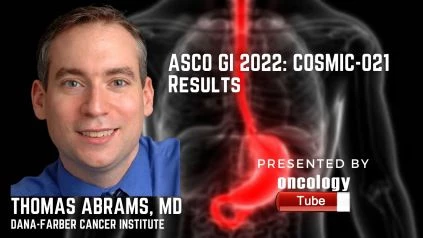Thomas Abrams, MD, Assistant Professor of Medicine at Dana-Farber Cancer Institute. In this video, he speaks about the ASCO GI 2022 Abstract – A phase 1b multitumor cohort study of cabozantinib plus atezolizumab in advanced solid tumors (COSMIC-021): Results of the colorectal cancer cohort.
Â
Â
Origins:
Â
Cabozantinib, a multiple receptor tyrosine kinase inhibitor, provides an immunological-permissive milieu, which may help immune checkpoint inhibitors work more effectively. The combination of cabozantinib and atezolizumab, an anti-PD-L1 agent, is being tested in COSMIC-021 (NCT03170960) in patients with advanced solid malignancies. The researchers present the results of patients with metastatic colorectal cancer (mCRC) who had previously been treated with fluoropyrimidine-containing treatment.
Â
Methodologies:
Â
Patients with mCRC with an ECOG PS of 0–1 who progressed during or after fluoropyrimidine plus oxaliplatin or irinotecan treatment were suitable. Prior anti-cancer therapy, including EGFR-targeted therapy, was approved in up to two lines. Pts with a high level of microsatellite instability (MSI-H) and/or a lack of mismatch repair (MMR) were eliminated. Cabozantinib 40 mg PO QD and atezolizumab 1200 mg IV Q3W were given to the patients. The investigator’s primary outcome was the objective response rate (ORR) per RECIST 1.1. Safety, duration of response (DOR), progression-free survival (PFS), and overall survival were among the other goals (OS). CT/MRI scans were done every six weeks for the first year and every twelve weeks after that.
Â
Findings:
Â
31 patients were given cabozantinib plus atezolizumab (median age: 60 years [range: 31 to 79]; male: 58 percent; ECOG PS: 1, 61 percent; 2 prior lines of therapy: 71 percent; prior EGFR inhibitor: 16 percent; 3 tumor sites: 52 percent; tumors in the left colorectum: 71 percent). As of July 21, 2021, the median follow-up was 28.1 months (range, 24.2, 31.3). Cabozantinib plus atezolizumab showed clinical efficacy in patients with metastatic colorectal cancer (Table). In comparison to patients with mutations (n = 19), patients with wild-type RAS (n = 12) exhibited numerically longer PFS and OS, as well as a higher ORR (Table). Treatment-related adverse events (TRAEs) of any severity were reported in 28 (90 percent), with diarrhea (52 percent), fatigue (42 percent), and nausea being the most common (35 percent ). There were 16 (52%) Grade 3-4 TRAEs, with hypertension (10%), tiredness (6%), and elevated lipase (6%) being the most common; no Grade 5 occurrences were reported.
Â
Outcomes:
Â
Cabozantinib plus atezolizumab showed promising clinical activity in patients with advanced non-MSI-H/MMR-proficient CRC who had previously been treated. NCT03170960 is the number for the clinical trial.

